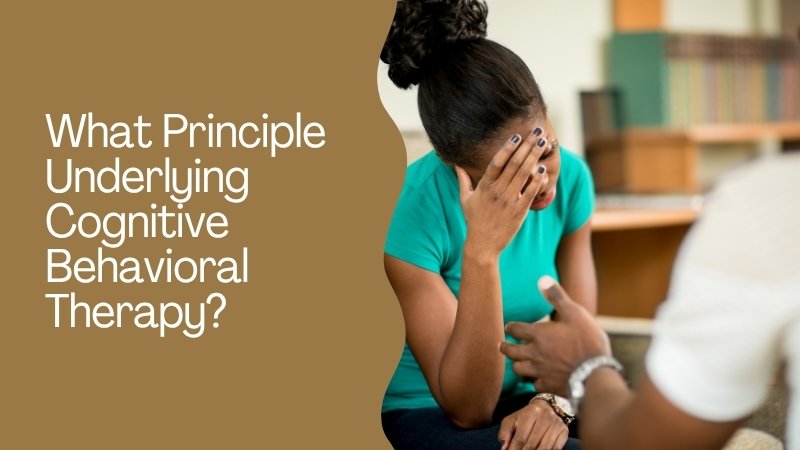If you’ve ever struggled with anxiety, depression, or even just everyday stress, there’s a good chance you’ve heard of Cognitive Behavioral Therapy (CBT). But what makes this therapy approach so powerful and effective for millions of people worldwide? The answer lies in a core principle that’s both simple and profound: Our thoughts influence our emotions and behaviors.
Let’s unpack what that really means and why this principle is transforming the way we approach mental health at Jacobson Community.
What Is Cognitive Behavioral Therapy (CBT)?
CBT is a structured, time-limited form of talk therapy that helps individuals identify and change unhelpful thinking patterns, behaviors, and emotional responses. It’s widely used to treat a variety of mental health conditions, including:
- Depression
- Anxiety disorders
- PTSD
- OCD
- Eating disorders
- Insomnia
- And more
CBT is a life tool, a framework to better understand oneself and react differently to life’s obstacles, but it goes beyond the diagnosis.
The Core Principle of CBT:
Let’s go straight to the heart of CBT:
“It’s not the event itself that causes distress, but how we interpret it.”
In CBT, the assumption is that our cognitive processes, the way we think, play a crucial role in how we feel and what we do. If your thoughts are distorted or irrational, they can lead to negative emotions and self-destructive behaviors.
Example:
Let’s say you wave at a friend across the street and they don’t wave back.
- Unhelpful Thought: “They must be ignoring me. Maybe they don’t like me anymore.”
- Emotion: Sadness, rejection.
- Behavior: You avoid reaching out to them.
But what if we challenge that thought?
- Alternative Thought: “Maybe they didn’t see me. It was pretty crowded.”
- Emotion: Neutral or curious.
- Behavior: You might send them a friendly text later.
That’s CBT in action.
Why This Matters to You or Your Loved One
At Jacobson Community, we don’t only utilize fashionable words like cognitive behavioral therapy. Because it enables patients to recover their mental health, we employ this framework on a regular basis in our clinical practice.
Toxic optimism is not the focus of CBT. It’s about thinking realistically and balancedly, which results in improved decision-making and healthier emotional consequences. It gives people the skills they need to work as their own therapists.
Key Components of CBT That Support This Principle
1. Cognitive Restructuring
This entails recognizing, disputing, and substituting better ideas for habitual negative thinking. It’s similar to taking a mental vacation.
2. Behavioral Activation
We help clients reconnect with activities that bring meaning and joy—because behaviors reinforce thoughts and emotions.
3. Exposure Techniques
For individuals with anxiety or trauma, gradual exposure to feared situations helps rewire emotional responses.
4. Homework Assignments
CBT thrives outside the therapy room. Clients often complete exercises between sessions to apply what they’ve learned.
What Makes CBT So Effective?
Cognitive behavioral therapy (CBT) is goal-focused, results-driven, and collaborative, in contrast to traditional treatment techniques that could dive endlessly into the past. This is why it is unique:
- Backed by decades of research
- Short-term but long-lasting
- Customizable to individual needs
- Teaches lifelong coping strategies
Who Benefits from CBT?
Almost everyone who is willing to put in the effort can benefit from CBT. It is particularly effective for:
- People who suffer from mood or anxiety problems
- People going through significant life changes
- Teens who are stressed out socially or academically
- Adults dealing with relationship problems or exhaustion
- Elderly people dealing with chronic disease or loneliness
CBT could be the turning point you need if you’re searching for a useful method to recognize your habits, end cycles, and feel more in control.
The Power of Self-Awareness
CBT shines a spotlight on your internal dialogue the constant stream of thoughts running in your mind. By learning to pause, question, and reframe those thoughts, you become less reactive and more resilient.
Imagine no longer being at the mercy of your emotions but instead having tools to steer your response. That’s the power CBT gives you.
Choosing Jacobson Community
Our licensed therapists are not only trained in CBT, but they genuinely care. We prioritize compassion, trust, and results. Here’s what makes us different:
- One-on-one tailored therapy sessions
- Family-centered and group-based CBT options
- Proven outcomes and measurable progress
- Supportive environment rooted in empathy
At Jacobson Community, your mental health journey is not just a checkbox—it’s a partnership.
Our Approach at Jacobson Community
We integrate CBT into our mental health programs in a way that meets people where they are, without overwhelming them. Whether you’re a teen struggling with school pressure, a parent battling burnout, or an adult coping with trauma, our team tailors CBT-based support to your unique needs.
No two clients are the same, so neither is our therapy.
Conclusion:
The principle behind CBT is powerful because it gives control back to the individual. You are not your thoughts. And once you realize that, you can start transforming how you feel, act, and experience life.
CBT doesn’t promise perfection, but it offers clarity, growth, and a path forward.
FAQs
How long does Cognitive Behavioral Therapy take to work?
CBT is usually short-term, with many clients seeing improvement in 6–12 sessions, though it depends on the person and condition.
Can CBT help with physical symptoms like headaches or fatigue?
Indeed! Because emotions and beliefs have an impact on the body, cognitive behavioral therapy frequently helps reduce the physical symptoms of stress.
Is CBT suitable for children or teens?
Absolutely. CBT is very effective for young people, especially when they’re dealing with anxiety, bullying, or academic pressure.
What’s the difference between CBT and regular talk therapy?
CBT is structured, goal-oriented, and focused on current problems, while traditional talk therapy may be more exploratory and past-focused.
Do I need a diagnosis to start CBT?
Not at all. Many people benefit from CBT even without a clinical diagnosis—it’s about improving mental wellness at any stage.


